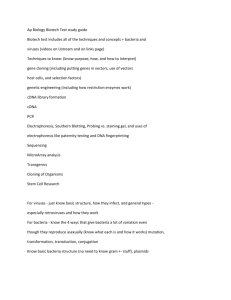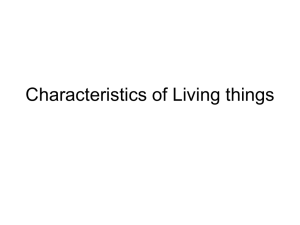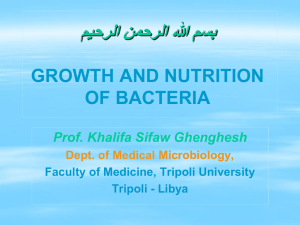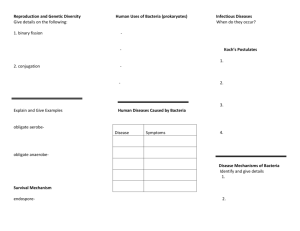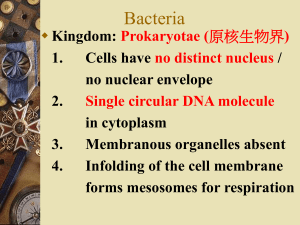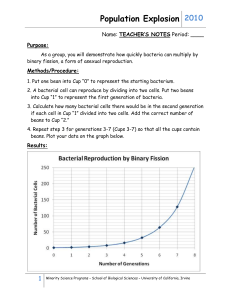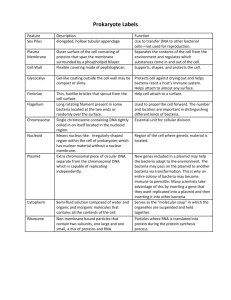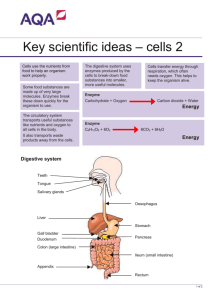68KB
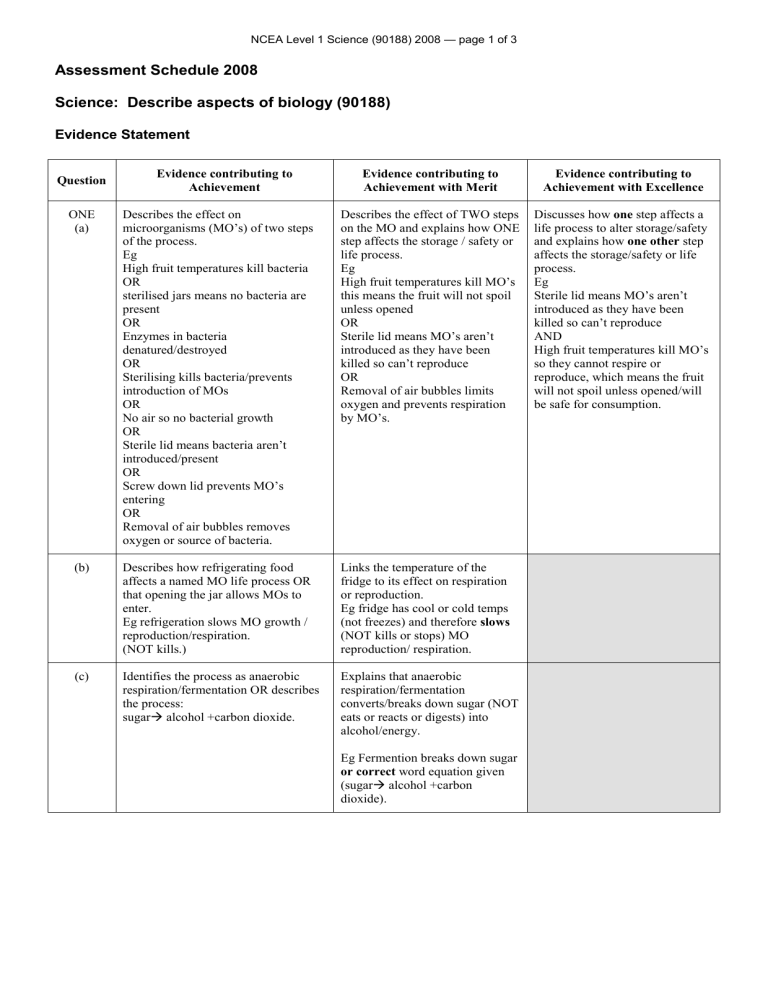
NCEA Level 1 Science (90188) 2008 — page 1 of 3
Assessment Schedule 2008
Science: Describe aspects of biology (90188)
Evidence Statement
Question
Evidence contributing to
Achievement
Evidence contributing to
Achievement with Merit
ONE
(a)
Describes the effect on microorganisms (MO’s) of two steps of the process.
Eg
High fruit temperatures kill bacteria
OR sterilised jars means no bacteria are present
OR
Enzymes in bacteria denatured/destroyed
OR
Sterilising kills bacteria/prevents introduction of MOs
OR
No air so no bacterial growth
OR
Sterile lid means bacteria aren’t introduced/present
OR
Screw down lid prevents MO’s entering
OR
Removal of air bubbles removes oxygen or source of bacteria.
Evidence contributing to
Achievement with Excellence
Describes the effect of TWO steps on the MO and explains how ONE step affects the storage / safety or life process.
Eg
High fruit temperatures kill MO’s this means the fruit will not spoil unless opened
OR
Sterile lid means MO’s aren’t introduced as they have been killed so can’t reproduce
OR
Removal of air bubbles limits oxygen and prevents respiration by MO’s.
Discusses how one step affects a life process to alter storage/safety and explains how one other step affects the storage/safety or life process.
Eg
Sterile lid means MO’s aren’t introduced as they have been killed so can’t reproduce
AND
High fruit temperatures kill MO’s so they cannot respire or reproduce, which means the fruit will not spoil unless opened/will be safe for consumption.
(b)
(c)
Describes how refrigerating food affects a named MO life process OR that opening the jar allows MOs to enter.
Eg refrigeration slows MO growth / reproduction/respiration.
(NOT kills.)
Identifies the process as anaerobic respiration/fermentation OR describes the process: sugar
alcohol +carbon dioxide.
Links the temperature of the fridge to its effect on respiration or reproduction.
Eg fridge has cool or cold temps
(not freezes) and therefore slows
(NOT kills or stops) MO reproduction/ respiration.
Explains that anaerobic respiration/fermentation converts/breaks down sugar (NOT eats or reacts or digests) into alcohol/energy.
Eg Fermention breaks down sugar or correct word equation given
(sugar
alcohol +carbon dioxide).
NCEA Level 1 Science (90188) 2008 — page 2 of 3
TWO
(a)
(b)
Describes viral replication OR recognises viruses need living cells/host (to replicate) OR describes conditions for growth of fungi/bacteria.
Eg
Genetic material is injected into host cell where the cell (nucleus) makes more and many new viruses are then released from cell.
OR
Bacteria / Fungi need food / nutrients / moisture for growth.
OR
Viruses require a host / living cell.
Gives a reason why viruses cannot be cultured (use living cells to replicate/reproduce)
AND
Reason why bacteria and fungi can be cultured on an agar plate.
Eg
Viruses need living cells to reproduce / replicate them.
Bacteria / Fungi need food / nutrients / moisture for growth which the agar plate provides.
Describes one similarity or difference between the fungal and bacterial colonies.
Eg
Bacteria and fungal spores arrive on the plate from the air/ direct contamination
OR
Fungi produce spores/hyphae/mycelium
AND
Bacteria reproduce through binary fission/split in two
OR
Can describe appearance of fungus
AND bacteria – fungus is fuzzy, bacteria is shiny.
Fungal and bacterial biology is used to explain TWO similarities or differences between any TWO of the arrival of MOs, growth of
MOs, the colony appearance.
Eg TWO of:
Bacteria and fungal spores are light so they float on the air to land on the agar.
Fungal spores grow hyphae when they land on the agar AND bacteria reproduce by binary fission.
Fungus is furry as sporangia thrust into the air and bacteria is shiny because they have no sporangia / have slime / shiny capsules.
Both bacteria and fungi feed using extracellular digestion.
Fungal and bacterial biology is used to explain three similarities or differences between any two of the arrival of MOs: growth of
MOs: the colony appearance.
Note: must have at least one difference and one similarity.
Eg
Both arrive by air, the fungus as spores and the bacteria as single bacterial cells.
Fungi look fuzzy as they have sporangia above the agar and bacteria look smooth as they have a slime capsule.
Both bacteria and fungi release enzymes to digest food substrate using extracellular digestion.
Fungi reproduce releasing spores through sporangia whilst bacteria reproduce by binary fission.
THREE
(a)
Describes the purpose of meiosis or recognises that chromosome number is halved.
Eg
Purpose of meiosis is to make gametes/sex cells/ sperm or eggs/produce variation.
OR
The chromosome number is halved/haploid.
Links the change in chromosome number to a role of the gamete.
Eg
½ chromosome no. to enable two cells to become new zygote with correct number/8/2n.
OR
One of each type of chromosome so that the zygote has two of every chromosome.
OR
Half chromosome number so two gametes can fertilise/restore original nos/somatic cell no/2n /produce variation .
Fully discusses previous reason for the link between change in chromosome number and role of the gamete.
Eg
Need half the chromosome number made by meiosis to enable fertilisation to form zygote. This means that each new cell has two copies of every gene/correct number of chromosomes.
AND this allows variation in any resulting offspring.
OR
If chromosome number doubled the cell would not function.
NCEA Level 1 Science (90188) 2008 — page 3 of 3
(b) Correct genotype of flies 12 and 14
eg: bb or homozygous recessive.
AND
Punnett square correctly shown with genotype of flies 12 and 14 indicated
( any letters used )
OR bb or homozygous recessive
AND
Correct reason why black is dominant or grey is recessive/reason why recessive is passed on from parents.
Correct genotype of flies 12 and
14 supported by evidence, eg:
Homozygous recessive/bb
AND
Punnett square correct showing clearly labelled correct genotype for flies 9 and 10.
AND reason given why recessive allele passed on from parents
OR
Reason given why black is dominant.
Eg –12 and 14 must be homozygous recessive because 9 and 10 must be heterozgous to give both colours of offspring / because they had some grey offspring.
( Not genes.)
Correct genotypes of flies 12 and
14 supported with reference to:
flies 9 and 10 and reasons for black being dominant/grey recessive and Punnett Square.
Punnett square and genotype explained by mention of hidden recessive alleles/dominant allele expressed if present or similar
( not genes ).
Eg – 9 and 10 must be heterozgous to give both colours of offspring. For grey colour to show a recessive allele must be inherited from both parents.
FOUR Describes a difference between cloning and selective breeding or describes the processes of cloning and selective breeding.
Eg
Cloning means there is no variation in the offspring whereas in selective breeding there is variation in offspring .
OR
Cloning is a mitotic division but selective breeding is meiosis.
OR
Only one parent contributes all the genes/chromosomes/genetic material in cloning but two parents do in selective breeding.
Gives a reason for the difference in the genetic characteristics based on the type of cell division in
EITHER selective breeding OR cloning.
Eg
Cloning means there is no variation in the offspring because they are produced by mitosis
Or in selective breeding there is variation in offspring . This is due to meiosis.
Gives a reason for the difference in the genetic characteristics based on the type of cell division in BOTH selective breeding AND cloning.
Eg
Cloning means there is no variation in the offspring whereas in breeding there is variation in offspring . This is due to meiosis being used in normal breeding.
Cloning would lack variation as it uses mitosis.
Judgement Statement
Achievement Achievement with Merit Achievement with Excellence
Total of FIVE opportunities answered at
Achievement (or higher).
5
A
Total of SIX opportunities answered with FOUR at Merit (or higher) and
TWO at Achievement level.
4
M + 2
A
Total of SIX opportunities answered with TWO at Excellence, THREE at
Merit (or higher) and ONE at
Achievement level.
2
E + 3
M + 1
A
